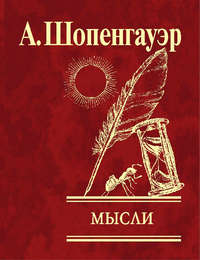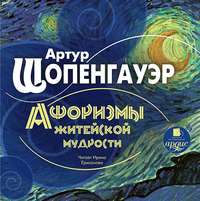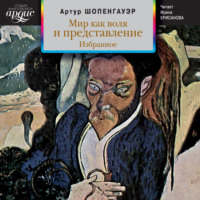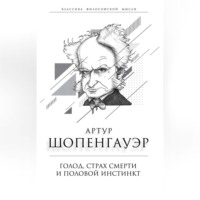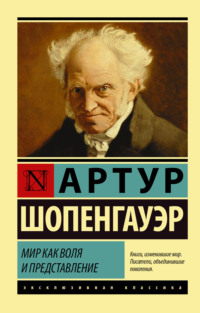 полная версия
полная версияThe World as Will and Idea (Vol. 3 of 3)
But the intention with which the poet sets our imagination in motion is to reveal to us the Ideas, i. e., to show us by an example what life and what the world is. The first condition of this is that he himself has known it; according as his knowledge has been profound or superficial so will his poem be. Therefore, as there are innumerable degrees of profoundness and clearness in the comprehension of the nature of things, so are there of poets. Each of these, however, must regard himself as excellent so far as he has correctly represented what he knew, and his picture answers to his original: he must make himself equal with the best, for even in the best picture he does not recognise more than in his own, that is, as much as he sees in nature itself; for his glance cannot now penetrate deeper. But the best himself recognises himself as such in the fact that he sees how superficial was the view of the others, how much lay beyond it which they were not able to repeat, because they did not see it, and how much further his own glance and picture reaches. If he understood the superficial poets as little as they do him, then he would necessarily despair; for just because it requires an extraordinary man to do him justice, but the inferior poets can just as little esteem him as he can them, he also has long to live upon his own approval before that of the world follows it. Meanwhile he is deprived even of his own approval, for he is expected to be very modest. It is, however, as impossible that he who has merit, and knows what it costs, should himself be blind to it, as that a man who is six feet high should not observe that he rises above others. If from the base of the tower to the summit is 300 feet, then certainly it is just as much from the summit to the base. Horace, Lucretius, Ovid, and almost all the ancients have spoken proudly of themselves, and also Dante, Shakspeare, Bacon of Verulam, and many more. That one can be a great man without observing anything of it is an absurdity of which only hopeless incapacity can persuade itself, in order that it may regard the feeling of its own insignificance as modesty. An Englishman has wittily and correctly observed that merit and modesty have nothing in common except the initial letter.22 I have always a suspicion about modest celebrities that they may very well be right; and Corneille says directly —
“La fausse humilité ne met plus en crédit:Je sçais ce que je vaux, et crois ce qu'on m'en dit.”Finally, Goethe has frankly said, “Only good-for-nothings are modest.” But the assertion would be still more certain that those who so eagerly demand modesty from others, urge modesty, unceasingly cry, “Only be modest, for God's sake, only be modest!” are positively good-for-nothings, i. e., persons entirely without merit, manufactures of nature, ordinary members of the great mass of humanity. For he who himself has merit also concedes merit – understands himself truly and really. But he who himself lacks all excellence and merit wishes there was no such thing: the sight of it in others stretches him upon the rack; pale, green, and yellow envy consumes his heart: he would like to annihilate and destroy all those who are personally favoured; but if unfortunately he must let them live, it must only be under the condition that they conceal, entirely deny, nay, abjure their advantages. This, then, is the root of the frequent eulogising of modesty. And if the deliverers of these eulogies have the opportunity of suppressing merit as it arises, or at least of hindering it from showing itself or being known, who can doubt that they will do it? For this is the practice of their theory.
Now, although the poet, like every artist, always brings before us only the particular, the individual, what he has known, and wishes by his work to make us know, is the (Platonic) Idea, the whole species; therefore in his images, as it were, the type of human characters and situations will be impressed. The narrative and also the dramatic poet takes the whole particular from life, and describes it accurately in its individuality, but yet reveals in this way the whole of human existence; for although he seems to have to do with the particular, in truth he is concerned with that which is everywhere and at all times. Hence it arises that sentences, especially of the dramatic poets, even without being general apophthegms, find frequent application in actual life. Poetry is related to philosophy as experience is related to empirical science. Experience makes us acquainted with the phenomenon in the particular and by means of examples, science embraces the whole of phenomena by means of general conceptions. So poetry seeks to make us acquainted with the (Platonic) Ideas through the particular and by means of examples. Philosophy aims at teaching, as a whole and in general, the inner nature of things which expresses itself in these. One sees even here that poetry bears more the character of youth, philosophy that of old age. In fact, the gift of poetry really only flourishes in youth; and also the susceptibility for poetry is often passionate in youth: the youth delights in verses as such, and is often contented with small ware. This inclination gradually diminishes with years, and in old age one prefers prose. By that poetical tendency of youth the sense of the real is then easily spoiled. For poetry differs from reality by the fact that in it life flows past us, interesting and yet painless; while in reality, on the contrary, so long as it is painless it is uninteresting, and as soon as it becomes interesting, it does not remain without pain. The youth who has been initiated into poetry earlier than into reality now desires from the latter what only the former can achieve; this is a principal source of the discomfort which oppresses the most gifted youths.
Metre and rhyme are a fetter, but also a veil which the poet throws round him, and under which he is permitted to speak as he otherwise dared not do; and that is what gives us pleasure. He is only half responsible for all that he says; metre and rhyme must answer for the other half. Metre, or measure, as mere rhythm, has its existence only in time, which is a pure perception a priori, thus, to use Kant's language, belongs merely to pure sensibility; rhyme, on the other hand, is an affair of sensation, in the organ of hearing, thus of empirical sensibility. Therefore rhythm is a much nobler and more worthy expedient than rhyme, which the ancients accordingly despised, and which found its origin in those imperfect languages which arose from the corruption of earlier ones and in barbarous times. The poorness of French poetry depends principally upon the fact that it is confined to rhyme alone without metre, and it is increased by the fact that in order to conceal its want of means it has increased the difficulty of rhyming by a number of pedantic laws, such as, for example, that only syllables which are written the same way rhyme, as if it were for the eye and not for the ear that the hiatus is forbidden; that a number of words must not occur; and many such, to all of which the new school of French poetry seeks to put an end. In no language, however, at least on me, does the rhyme make such a pleasing and powerful impression as in Latin; the rhymed Latin poems of the Middle Ages have a peculiar charm. This must be explained from the fact that the Latin language is incomparably more perfect, more beautiful and noble, than any modern language, and now moves so gracefully in the ornaments and spangles which really belong to the latter, and which it itself originally despised.
To serious consideration it might almost appear as high treason against our reason that even the slightest violence should be done to a thought or its correct and pure expression, with the childish intention that after some syllables the same sound of word should be heard, or even that these syllables themselves should present a kind of rhythmical beat. But without such violence very few verses would be made; for it must be attributed to this that in foreign languages verses are much more difficult to understand than prose. If we could see into the secret workshops of the poets, we would find that the thought is sought for the rhyme ten times oftener than the rhyme for the thought; and even when the latter is the case, it is not easily accomplished without pliability on the part of the thought. But the art of verse bids defiance to these considerations, and, moreover, has all ages and peoples upon its side, so great is the power which metre and rhyme exercise upon the feeling, and so effective the mysterious lenocinium which belongs to them. I would explain this from the fact that a happily rhymed verse, by its indescribably emphatic effect, raises the feeling as if the thought expressed in it lay already predestined, nay, performed in the language, and the poet has only had to find it out. Even trivial thoughts receive from rhythm and rhyme a touch of importance; cut a figure in this attire, as among girls plain faces attract the eye by finery. Nay, even distorted and false thoughts gain through versification an appearance of truth. On the other hand, even famous passages from famous poets shrink together and become insignificant when they are reproduced accurately in prose. If only the true is beautiful, and the dearest ornament of truth is nakedness, then a thought which appears true and beautiful in prose will have more true worth than one which affects us in the same way in verse. Now it is very striking, and well worth investigating, that such trifling, nay, apparently childish, means as metre and rhyme produce so powerful an effect. I explain it to myself in the following manner: That which is given directly to the sense of hearing, thus the mere sound of the words, receives from rhythm and rhyme a certain completeness and significance in itself for it thereby becomes a kind of music; therefore it seems now to exist for its own sake, and no longer as a mere means, mere signs of something signified, the sense of the words. To please the ear with its sound seems to be its whole end, and therefore with this everything seems to be attained and all claims satisfied. But that it further contains a meaning, expresses a thought, presents itself now as an unexpected addition, like words to music – as an unexpected present which agreeably surprises us – and therefore, since we made no demands of this kind, very easily satisfies us; and if indeed this thought is such that, in itself, thus said in prose, it would also be significant, then we are enchanted. I can remember, in my early childhood, that I had delighted myself for a long time with the agreeable sound of verse before I made the discovery that it all also contained meaning and thoughts. Accordingly there is also, in all languages, a mere doggerel poetry almost entirely devoid of meaning. Davis, the Sinologist, in the preface to his translation of the “Laou-sang-urh,” or “An Heir in Old Age” (London, 1817), observes that the Chinese dramas partly consist of verses which are sung, and adds: “The meaning of them is often obscure, and, according to the statements of the Chinese themselves, the end of these verses is especially to flatter the ear, and the sense is neglected, and even entirely sacrificed to the harmony.” Who is not reminded here of the choruses of many Greek tragedies which are often so hard to make out?
The sign by which one most immediately recognises the genuine poet, both of the higher and lower species, is the unforced nature of his rhymes. They have appeared of themselves as if by divine arrangement; his thoughts come to him already in rhyme. The homely, prosaic man on the contrary, seeks the rhyme for the thought; the bungler seeks the thought for the rhyme. Very often one can find out from a couple of rhymed verses which of the two had the thought and which had the rhyme as its father. The art consists in concealing the latter, so that such lines may not appear almost as mere stuffed out boutsrimés.
According to my feeling (proofs cannot here be given) rhyme is from its nature binary: its effect is limited to one single recurrence of the same sound, and is not strengthened by more frequent repetition. Thus whenever a final syllable has received the one of the same sound its effect is exhausted; the third recurrence of the note acts merely as a second rhyme which accidentally hits upon the same sound, but without heightening the effect; it links itself on to the existing rhyme, yet without combining with it to produce a stronger impression. For the first note does not sound through the second on to the third: therefore this is an æsthetic pleonasm, a double courage which is of no use. Least of all, therefore, do such accumulations of rhymes merit the heavy sacrifices which they cost in the octave rhyme, the terza rima, and the sonnet, and which are the cause of the mental torture under which we sometimes read such productions, for poetical pleasure is impossible under the condition of racking our brains. That the great poetical mind sometimes overcomes even these forms, and moves in them with ease and grace, does not extend to a recommendation of the forms themselves, for in themselves they are as ineffectual as they are difficult. And even in good poets, when they make use of these forms, we frequently see the conflict between the rhyme and the thought, in which now one and now the other gains the victory; thus either the thought is stunted for the sake of the rhyme, or the rhyme has to be satisfied with a weak à peu près. Since this is so, I do not regard it as an evidence of ignorance, but as a proof of good taste, that Shakspeare in his sonnets has given different rhymes to each quatraine. At any rate, their acoustic effect is not in the least diminished by it, and the thought obtains its rights far more than it could have done if it had had to be laced up in the customary Spanish boots.
It is a disadvantage for the poetry of a language if it has many words which cannot be used in prose, and, on the other hand, dare not use certain words of prose. The former is mostly the case in Latin and Italian poetry, and the latter in French, where it has recently been very aptly called, “La bégeulerie de la langue française;” both are to be found less in English, and least in German. For such words belonging exclusively to poetry remain foreign to our heart, do not speak to us directly, and therefore leave us cold. They are a conventional language of poetry, and as it were mere painted sensations instead of real ones: they exclude genuine feeling.
The distinction, so often discussed in our own day, between classic and romantic poetry seems to me ultimately to depend upon the fact that the former knows no other motives than those which are purely human, actual, and natural; the latter, on the other hand, also treats artificial conventional, and imaginary motives as efficient. To such belong the motives which spring from the Christian mythus, also from the chivalrous over-strained fantastical law of honour, further from the absurd and ludicrous Germano-Christian veneration of women, and lastly from doting and mooning hyperphysical amorousness. But even in the best poets of the romantic class, e. g., in Calderon, we can see to what ridiculous distortions of human relations and human nature these motives lead. Not to speak of the Autos, I merely refer to such pieces as “No siempre el peor es cierto” (The worst is not always certain), and “El postrero duelo en España” (The last duel in Spain), and similar comedies en capa y espada: with the elements mentioned there is here further associated the scholastic subtility so often appearing in the conversation which at that time belonged to the mental culture of the higher classes. How decidedly advantageous, on the contrary, is the position of the poetry of the ancients, which always remains true to nature; and the result is that classical poetry has an unconditional, romantic poetry only a conditional, truth and correctness; analogous to Greek and Gothic architecture. Yet, on the other hand, we must remark here that all dramatic or narrative poems which transfer their scene to ancient Greece or Rome lose by this from the fact that our knowledge of antiquity, especially in what concerns the details of life, is insufficient, fragmentary, and not drawn from perception. This obliges the poet to avoid much and to content himself with generalities, whereby he becomes abstract, and his work loses that concreteness and individualisation which is throughout essential to poetry. It is this which gives all such works the peculiar appearance of emptiness and tediousness. Only Shakspeare's works of this kind are free from it; because without hesitation he has presented, under the names of Greeks and Romans, Englishmen of his own time.
It has been objected to many masterpieces of lyrical poetry, especially some Odes of Horace (see, for example, the second of the third book) and several of Goethe's songs (for example, “The Shepherd's Lament”), that they lack proper connection and are full of gaps in the thought. But here the logical connection is intentionally neglected, in order that the unity of the fundamental sensation and mood may take its place, which comes out more clearly just by the fact that it passes like a thread through the separate pearls, and brings about the quick changes of the objects of contemplation, in the same way as in music the transition from one key to another is brought about by the chord of the seventh, through which the still sounding fundamental note becomes the dominant of the new key. Most distinctly, even exaggeratedly, the quality here described is found in the Canzone of Petrarch which begins, “Mai non vo' più cantar, com' io soleva.”
Accordingly, as in the lyrical poem the subjective element predominates, so in the drama, on the contrary, the objective element is alone and exclusively present. Between the two epic poetry in all its forms and modifications, from the narrative romance to the epos proper, has a broad middle path. For although in the main it is objective, yet it contains a subjective element, appearing now more and now less, which finds its expression in the tone, in the form of the delivery, and also in scattered reflections. We do not so entirely lose sight of the poet as in the drama.
The end of the drama in general is to show us in an example what is the nature and existence of man. The sad or the bright side of these can be turned to us in it, or their transitions into each other. But the expression, “nature and existence of man,” already contains the germ of the controversy whether the nature, i. e., the character, or the existence, i. e., the fate, the adventures, the action, is the principal thing. Moreover, the two have grown so firmly together that although they can certainly be separated in conception, they cannot be separated in the representation of them. For only the circumstances, the fate, the events, make the character manifest its nature, and only from the character does the action arise from which the events proceed. Certainly, in the representation, the one or the other may be made more prominent; and in this respect the piece which centres in the characters and the piece which centres in the plot are the two extremes.
The common end of the drama and the epic, to exhibit, in significant characters placed in significant situations, the extraordinary actions brought about by both, will be most completely attained by the poet if he first introduces the characters to us in a state of peace, in which merely their general colour becomes visible, and allows a motive to enter which produces an action, out of which a new and stronger motive arises, which again calls forth a more significant action, which, in its turn, begets new and even stronger motives, whereby, then, in the time suitable to the form of the poem, the most passionate excitement takes the place of the original peace, and in this now the important actions occur in which the qualities of the characters which have hitherto slumbered are brought clearly to light, together with the course of the world.
Great poets transform themselves into each of the persons to be represented, and speak out of each of them like ventriloquists; now out of the hero, and immediately afterwards out of the young and innocent maiden, with equal truth and naturalness: so Shakspeare and Goethe. Poets of the second rank transform the principal person to be represented into themselves. This is what Byron does; and then the other persons often remain lifeless, as is the case even with the principal persons in the works of mediocre poets.
Our pleasure in tragedy belongs, not to the sense of the beautiful, but to that of the sublime; nay, it is the highest grade of this feeling. For, as at the sight of the sublime in nature we turn away from the interests of the will, in order to be purely perceptive, so in the tragic catastrophe we turn away even from the will to live. In tragedy the terrible side of life is presented to us, the wail of humanity, the reign of chance and error, the fall of the just, the triumph of the wicked; thus the aspect of the world which directly strives against our will is brought before our eyes. At this sight we feel ourselves challenged to turn away our will from life, no longer to will it or love it. But just in this way we become conscious that then there still remains something over to us, which we absolutely cannot know positively, but only negatively, as that which does not will life. As the chord of the seventh demands the fundamental chord; as the colour red demands green, and even produces it in the eye; so every tragedy demands an entirely different kind of existence, another world, the knowledge of which can only be given us indirectly just as here by such a demand. In the moment of the tragic catastrophe the conviction becomes more distinct to us than ever that life is a bad dream from which we have to awake. So far the effect of the tragedy is analogous to that of the dynamical sublime, for like this it lifts us above the will and its interests, and puts us in such a mood that we find pleasure in the sight of what tends directly against it. What gives to all tragedy, in whatever form it may appear, the peculiar tendency towards the sublime is the awakening of the knowledge that the world, life, can afford us no true pleasure, and consequently is not worthy of our attachment. In this consists the tragic spirit: it therefore leads to resignation.
I admit that in ancient tragedy this spirit of resignation seldom appears and is expressed directly. Œdipus Colonus certainly dies resigned and willing; yet he is comforted by the revenge on his country. Iphigenia at Aulis is very willing to die; yet it is the thought of the welfare of Greece that comforts her, and occasions the change of her mind, on account of which she willingly accepts the death which at first she sought to avoid by any means. Cassandra, in the Agamemnon of the great Æschylus, dies willingly, αρκειτω βιος (1306); but she also is comforted by the thought of revenge. Hercules, in the Trachiniæ, submits to necessity, and dies composed, but not resigned. So also the Hippolytus of Euripides, in whose case it surprises us that Artemis, who appears to comfort him, promises him temples and fame, but never points him to an existence beyond life, and leaves him in death, as all gods forsake the dying: – in Christianity they come to him; and so also in Brahmanism and Buddhism, although in the latter the gods are really exotic. Thus Hippolytus, like almost all the tragic heroes of the ancients, shows submission to inevitable fate and the inflexible will of the gods, but no surrender of the will to live itself. As the Stoic equanimity is fundamentally distinguished from Christian resignation by the fact that it teaches only patient endurance and composed expectation of unalterably necessary evil, while Christianity teaches renunciation, surrender of the will; so also the tragic heroes of the ancients show resolute subjection under the unavoidable blows of fate, while Christian tragedy, on the contrary, shows the surrender of the whole will to live, joyful forsaking of the world in the consciousness of its worthlessness and vanity. But I am also entirely of opinion that modern tragedy stands higher than that of the ancients. Shakspeare is much greater than Sophocles; in comparison with Goethe's Iphigenia one might find that of Euripides almost crude and vulgar. The Bacchæ of Euripides is a revolting composition in favour of the heathen priests. Many ancient pieces have no tragic tendency at all, like the Alcestis and Iphigenia in Tauris of Euripides; some have disagreeable, or even disgusting motives, like the Antigone and Philocteles. Almost all show the human race under the fearful rule of chance and error, but not the resignation which is occasioned by it, and delivers from it. All because the ancients had not yet attained to the summit and goal of tragedy, or indeed of the view of life itself.


